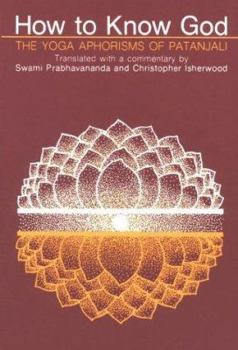How to Know God: The Yoga Aphorisms of Patanjali
Select Format
Select Condition 
Book Overview
Como conocer a Dios: Los Aforismos de Yoga de Patanjali Traducido por Swami Prabhavananda y Christopher Isherwood T cnicas para lograr paz y libertad interior que la humanidad ha usado positivamente... This description may be from another edition of this product.
Format:Paperback
Language:English
ISBN:0874810418
ISBN13:9780874810417
Release Date:August 1953
Publisher:Vedanta Press
Length:256 Pages
Weight:0.52 lbs.
Dimensions:0.6" x 4.4" x 6.4"
Customer Reviews
4 ratings
Mind Changer
Published by Thriftbooks.com User , 16 years ago
I had a bit of difficulty finding connections but I am still pondering many of the points of this read.
A Gem of a Book
Published by Thriftbooks.com User , 18 years ago
The Yoga Sutras (thread of aphorisms) of Patanjali are one of the six darshanas of the Hindu or Vedic schools. "How to Know God" is a beautiful translation of those. The book is relatively short (pocket sized with just over 200 pages) and very readable. It offers one of the clearest explanations of the practice of yoga and meditation that I have read. It is surprisingly practical. I value it almost as much as I do "The Art and Science of Raja Yoga: Fourteen Steps to Higher Awareness: Based on the Teachings of Paramhansa Yogananda" and Osho's "The Book of Secrets: 112 Keys to the Mystery Within" as a practical guide to specific meditation techniques. For those who have a Christian background, the book references familiar Christian concepts, making the book all the more readable for the typical Westerner. While one can read the entire book in one sitting (and maybe this is a useful strategy for its first reading), I prefer to digest it slowly, contemplating and savoring each aphorism. I highly recommend this book for anyone who wants to enter into a deeper level of spiritual consciousness.
How to know yourself.
Published by Thriftbooks.com User , 21 years ago
Although this book is a study of Patanjali's Yoga Sutras, it will appeal to devotees of any religion--Hindu, Christian, or Buddhism--or to anyone interested in living a spiritual life. It is not so much a "how-to" guide in knowing God--for "there are innumerable approaches to him" (p. 66), as an examination of knowing one's real Self.Patanjali's Sutras are dated sometime between the fourth century B.C. and the fourth century A.D. (p. 7), and they offer methods for gaining insights through our own experience into "the Godhead, the Reality which underlies this apparent, ephemeral universe" (p. 15). He observes that in order to know God, one must first cease identifying himself with the mind (p. 213). Our liberation, he tells us, is "retarded" by our past karmas, our fears and desires, our lack of energy (p. 52), our egotism, ignorance, and blind clinging (p. 55), and by such obstacles as sickness, mental laziness, sloth, doubts and despair (p. 64). However, the good news is that no effort to know God, however small, is wasted (p. 52), for God draws us to himself (p. 54). With a little exploration, it is possible to know God everywhere, "both within and without, instantly present and infinitely elsewhere, the dweller in the atom and the abode of all things" (p. 33).Although I am not qualified to comment on their translation of Patanjali, Christopher Isherwood and Swami Prabhavananda's Vendantist commentary offers worthwhile insights into Patanjali's Sutras.G. Merritt
ancient but ever new, always true
Published by Thriftbooks.com User , 22 years ago
over 1500 years ago the great indian sage, Patanjali, compiled these yoga aphorisms as a help and guide to his fellow humans. in the cosmic scheme of things 1500 years is the blink of an eye, and so it is these wise sayings remain fresh and workable for the modern lover of spiritual wisdom. the aphorisms stand on their own as originally given to the world. succint, vital, the feel of eternal truth is in them. to read and meditate on these sayings is to go another step closer to your own realization that indeed, it is only ignorance which stops us from seeing the reality of the Atman as One with eternal Brahman, the "satchitananda" or existance, conciousness, bliss, the eternal ground of all that is or ever could be. this beautiful classic is further enhanced by the translation and commentaries of the dynamic duo, swami prabhavananda and christopher isherwood. modern ideas about god and truth come and go, this book has stood the test of time and remains ever new because it's true. i highly recommend this little book to anyone interested in the light that comes when Truth is seen.






